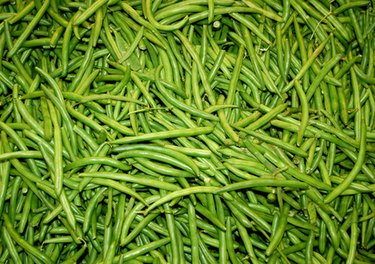
White leaves on green bean plants can be a sign that the plant is being attacked by one of three types of fungi: powdery mildew, bean rust or pythium blight. Prevention methods, such as planting disease-resistant seeds, ensuring soil nutrition or using fungicides, can help eliminate the problem before it occurs.
Powdery Mildew
Video of the Day
Powdery mildew is one cause of green bean leaves turning white. This white powdery substance is found most often on older green bean plant leaves, according to the University of Florida. What begins as small round white spots on older leaves can grow until the entire leaf is covered with this powdery white substance. Powdery mildew can eventually turn more serious and affect all the above-ground green bean plant parts. As the fungus gets worse, the leaves will begin to turn yellow in color. If the pods become infected they will turn purple.
Video of the Day
Control methods include using resistant bean varieties, making sure soil is nutritionally balanced and fertilized, as well as use of fungicides that contain sulfur.
Bean Rust
Another cause of green beans turning white is bean rust. Like powdery mildew, bean rust is more commonly found on older plant leaves. You can first notice it on the underside of the leaf surface in late winter or early spring. It initially appears as a small but slightly raised spot, similar to a pimple. These white spots may also have a yellow ring around them. Within one week, these white spots grow larger and turn the color of rust. To verify this is bean rust, just touch the leaf with your fingers. If your fingers come away with some of the rust color on them, it is likely you are dealing with this fungus.
As the fungus grows, the upper leaf will also be covered with the rust-colored spots and the leaf will turn yellow. Leaves collapse, dry up and eventually drop as the fungus progresses. The fungus can extend to the pods as well, eventually destroying your bean plants if not addressed. Once you have had bean rust you should not replant beans in that location again for at least two growing seasons. Crop rotation, using resistant bean varieties, weed control, sanitation and fungicides help deal with bean rust.
Pythium Blight
Pythium blight, another cause of green bean leaves turning white, is a fungus that occurs most often during hot weather. The hot weather combined with wet conditions contribute to the production of pythium blight in the soil. This fungus can attack green been plant seeds before or after they start growing. It produces a white mold-type growth, initially near the soil line of the plant. As it progresses up the stem, it can infect the leaves as well.
Unfortunately, once pythium blight has begun to attack your green bean plants there is little you can to do about it. You can, however, plant future green bean plants during cooler times of the year to help prevent its possibility, or treat seeds with a fungicide prior to planting.